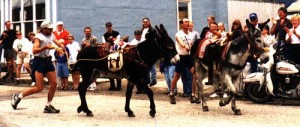Review by Martha Quillen
Historical Fiction – March 2004 – Colorado Central Magazine
Fireweed: A Woman’s Saga in Gold Rush America?
by Carolyn Evans Campbell
Published in 2003
by Georgetown Editions, Evergreen CO
ISBN 0-9631703-7-6
THE BOOKS WE REVIEW generally have some connection with Central Colorado. Either they’re set here, or written by someone who lives here, or they’re about Colorado politics, or wildfires, or something else that affects us.
But Fireweed is a novel about the Oregon Trail and the California gold rush, and the author lives in Denver. Carolyn Campbell has a relative in Central Colorado who lent us this book, though….
And hey, we like books about the old west, trails, and pioneering, so Denver seemed close enough in this case.
Besides, this novel is definitely rooted in western history. In fact, as the characters head toward Oregon, readers who know their western history will often realize what’s going to happen next — because many incidents come right out of trail diaries.
But there was another reason that this novel seemed to fit in with the sort of books Colorado Central normally reviews. Fireweed was put out by a small regional publisher (which is a profession that we feel honor-bound to support).
Unfortunately, though, or perhaps fortunately (as the case may be), this novel has a lot of the strengths and flaws associated with such home-grown products.
Personally, I don’t expect locally produced books to reflect the expensive production values and copy-editing of the national houses. But smaller houses can put out something fresh and different.
That seems to happen more often with non-fiction, however. Such books often include information, records, interviews, and issues that national publishers would never have bothered with, and even when the lay-out is careless and the prose is unexceptional, there’s often an enthusiasm for our region that shines through and elevates the whole volume.
Locally produced novels, however, usually seem to fall short. Quality, of course, varies greatly. Some novels lack smooth prose or good production values. Others are beautifully produced, but factually faulty. And some are pretty well done (although they’re seldom as polished as national publishers can make them).
Even the best of the locally produced novels, however, tend to be exceptionally derivative. All too often, local writers and publishers seem to stick with tired conventions — as if banality and platitudes are what makes books professional (and sadly enough, that may be true). But this adherence to cliché means local novels are frequently just pale imitations of best-sellers.
— Which brings me back to Fireweed.
This is definitely the best locally produced novel I’ve read in years. The characters are endearing; the story keeps you going;the history is reasonably accurate.
In places, history buffs are bound to take issue with some of Campbell’s facts, but my quibbles were less with fact than with outlook.
For example, Campbell writes: “No one quite understood the behavior of the different Indian tribes. Some were peaceful — helpful even. Others were hostile.” And that’s fair enough.
Campbell, however, characterizes the Sioux as especially hostile, and the Sioux were at war by the 1860s. But it seems rather unsportsmanlike to single the Sioux out when writing about 1848. In the 1840s, the Sante Fe trail was more dangerous than the Oregon Trail. Furthermore, problems on the Oregon Trail often happened near Fort Hall and beyond, (which is way past Sioux territory).
On the other hand, Campbell could probably make a case for her view — since the Sioux were warriors who fought with other tribes and no doubt struck fear into the hearts of emigrants. But when the author characterizes an entire Spanish family in California as arrogant and cruel, you wonder if maybe a little more political correctness wouldn’t be a good thing.
These flaws, however, are minor, since Fireweed is merely stereo-typical in places and not bigotted.
But the characters also tend to be a bit stereo-typed, and more than a mite anachronistic. Jenna Daggett, for example, evolves into a modern heroine: confident, independent, and self-supporting. But in the 1850s, her nonconformist life would have been a lot harder to pursue than this book implies. Though many Western women followed unusual paths — like Josephine Earp, Calamity Jane, and Anne Ellis — few of them managed to stay as well-fed and respectable as Jenna.
Until the end, the reader is seldom sure whether Fireweed will veer off into romance, or turn into a multi- generational family saga, or spin into a feminist fantasy like The Women’s Room or First Wives Club, but from start to finish the book has a defininite genre-fiction feel to it.
Campbell writes a tale of endurance, but Jenna is altogether too hardy — and too darned spunky — for belief. Jenna just keeps on going, a bit too much like the Energizer Bunny, or perhaps more like the imperiled Pauline who kept getting tied to the railroad tracks.
Fireweed would have been far more credible — and inspiring — if the author had avoided common conventions, like making Jenna too rich, too beautiful, too resourceful, and too all-fired good at getting over things.
When the book opens, Jenna Daggett is a young girl from Missouri traversing the Oregon Trail with an enthusiastic father, an emotionally unstable mother, and a very sick baby brother.
Jenna’s mother doesn’t want to go West; she wants to be with her family and friends back home, and she resents Jenna and her husband for enjoying the trip.
But Jenna’s father prevails; things will get better he assures his wife.
Then an accident leaves Jenna feeling guilty and shaken, and her mother’s increasingly neurotic behavior makes things worse….
From there, this book could have gone anywhere, but it veered into a predictable pattern. Before long, Jenna proves remarkably resilient, putting horror after horror behind her, again and again. Jenna just keeps brushing herself off and getting back into the fray, but you’re never quite sure how or why she does that.
Fireweed is definitely the best locally produced novel I’ve read in a long time. But it’s also a little more blemished than its national prototypes, with a few more typos.
Still, it’s not bad … in the scheme of things. All in all, Fireweed is a coherent, entertaining, fast read. But when I reflect on Jenna Daggett’s potential, I can’t help but think that she — and Fireweed — could have been so much more .–Martha Quillen



